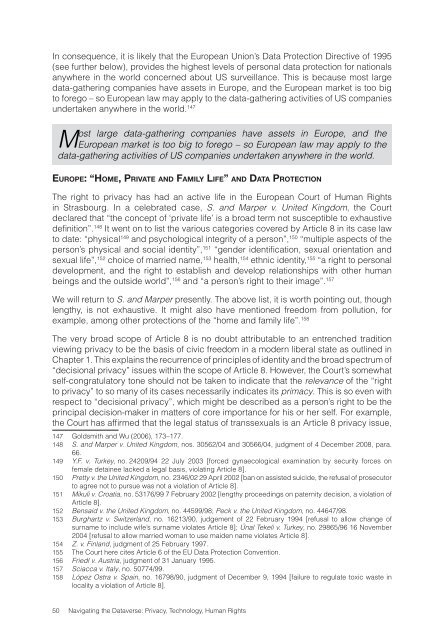Navigating the Dataverse: Privacy, Technology ... - The ICHRP
Navigating the Dataverse: Privacy, Technology ... - The ICHRP
Navigating the Dataverse: Privacy, Technology ... - The ICHRP
You also want an ePaper? Increase the reach of your titles
YUMPU automatically turns print PDFs into web optimized ePapers that Google loves.
In consequence, it is likely that <strong>the</strong> European Union’s Data Protection Directive of 1995<br />
(see fur<strong>the</strong>r below), provides <strong>the</strong> highest levels of personal data protection for nationals<br />
anywhere in <strong>the</strong> world concerned about US surveillance. This is because most large<br />
data-ga<strong>the</strong>ring companies have assets in Europe, and <strong>the</strong> European market is too big<br />
to forego – so European law may apply to <strong>the</strong> data-ga<strong>the</strong>ring activities of US companies<br />
undertaken anywhere in <strong>the</strong> world. 147<br />
Most large data-ga<strong>the</strong>ring companies have assets in Europe, and <strong>the</strong><br />
European market is too big to forego – so European law may apply to <strong>the</strong><br />
data-ga<strong>the</strong>ring activities of US companies undertaken anywhere in <strong>the</strong> world.<br />
Europe: “Home, Private and Family Life” and Data Protection<br />
<strong>The</strong> right to privacy has had an active life in <strong>the</strong> European Court of Human Rights<br />
in Strasbourg. In a celebrated case, S. and Marper v. United Kingdom, <strong>the</strong> Court<br />
declared that “<strong>the</strong> concept of ‘private life’ is a broad term not susceptible to exhaustive<br />
definition”. 148 It went on to list <strong>the</strong> various categories covered by Article 8 in its case law<br />
to date: “physical 149 and psychological integrity of a person”, 150 “multiple aspects of <strong>the</strong><br />
person’s physical and social identity”, 151 “gender identification, sexual orientation and<br />
sexual life”, 152 choice of married name, 153 health, 154 ethnic identity, 155 “a right to personal<br />
development, and <strong>the</strong> right to establish and develop relationships with o<strong>the</strong>r human<br />
beings and <strong>the</strong> outside world”, 156 and “a person’s right to <strong>the</strong>ir image”. 157<br />
We will return to S. and Marper presently. <strong>The</strong> above list, it is worth pointing out, though<br />
lengthy, is not exhaustive. It might also have mentioned freedom from pollution, for<br />
example, among o<strong>the</strong>r protections of <strong>the</strong> “home and family life”. 158<br />
<strong>The</strong> very broad scope of Article 8 is no doubt attributable to an entrenched tradition<br />
viewing privacy to be <strong>the</strong> basis of civic freedom in a modern liberal state as outlined in<br />
Chapter 1. This explains <strong>the</strong> recurrence of principles of identity and <strong>the</strong> broad spectrum of<br />
“decisional privacy” issues within <strong>the</strong> scope of Article 8. However, <strong>the</strong> Court’s somewhat<br />
self-congratulatory tone should not be taken to indicate that <strong>the</strong> relevance of <strong>the</strong> “right<br />
to privacy” to so many of its cases necessarily indicates its primacy. This is so even with<br />
respect to “decisional privacy”, which might be described as a person’s right to be <strong>the</strong><br />
principal decision-maker in matters of core importance for his or her self. For example,<br />
<strong>the</strong> Court has affirmed that <strong>the</strong> legal status of transsexuals is an Article 8 privacy issue,<br />
147 Goldsmith and Wu (2006), 173–177.<br />
148 S. and Marper v. United Kingdom, nos. 30562/04 and 30566/04, judgment of 4 December 2008, para.<br />
66.<br />
149 Y.F. v. Turkey, no. 24209/94 22 July 2003 [forced gynaecological examination by security forces on<br />
female detainee lacked a legal basis, violating Article 8].<br />
150 Pretty v. <strong>the</strong> United Kingdom, no. 2346/02 29 April 2002 [ban on assisted suicide, <strong>the</strong> refusal of prosecutor<br />
to agree not to pursue was not a violation of Article 8].<br />
151 Mikuli v. Croatia, no. 53176/99 7 February 2002 [lengthy proceedings on paternity decision, a violation of<br />
Article 8].<br />
152 Bensaid v. <strong>the</strong> United Kingdom, no. 44599/98; Peck v. <strong>the</strong> United Kingdom, no. 44647/98.<br />
153 Burghartz v. Switzerland, no. 16213/90, judgement of 22 February 1994 [refusal to allow change of<br />
surname to include wife’s surname violates Article 8]; Ünal Tekeli v. Turkey, no. 29865/96 16 November<br />
2004 [refusal to allow married woman to use maiden name violates Article 8].<br />
154 Z. v. Finland, judgment of 25 February 1997.<br />
155 <strong>The</strong> Court here cites Article 6 of <strong>the</strong> EU Data Protection Convention.<br />
156 Friedl v. Austria, judgment of 31 January 1995.<br />
157 Sciacca v. Italy, no. 50774/99.<br />
158 López Ostra v. Spain, no. 16798/90, judgment of December 9, 1994 [failure to regulate toxic waste in<br />
locality a violation of Article 8].<br />
50 <strong>Navigating</strong> <strong>the</strong> <strong>Dataverse</strong>: <strong>Privacy</strong>, <strong>Technology</strong>, Human Rights
















